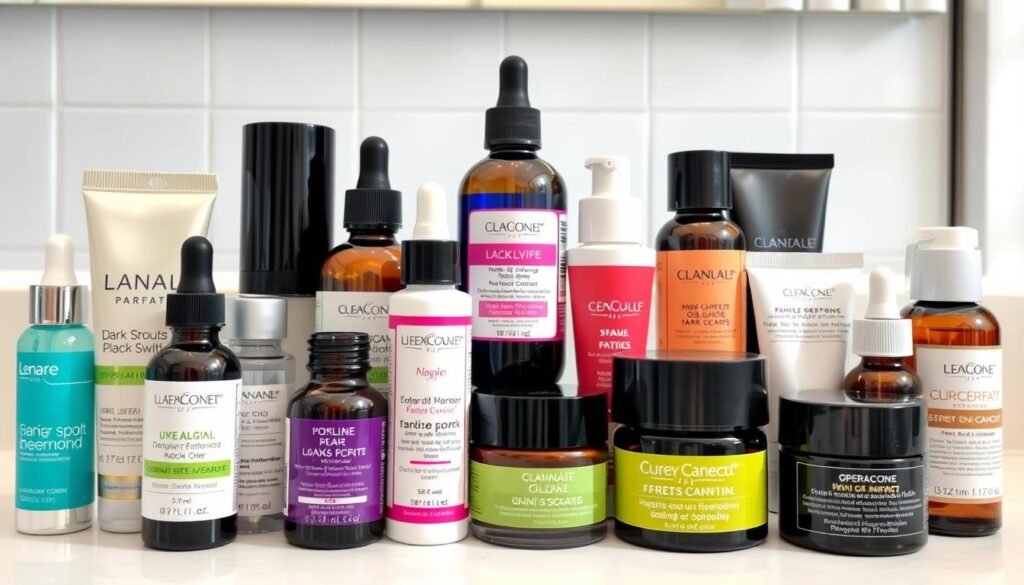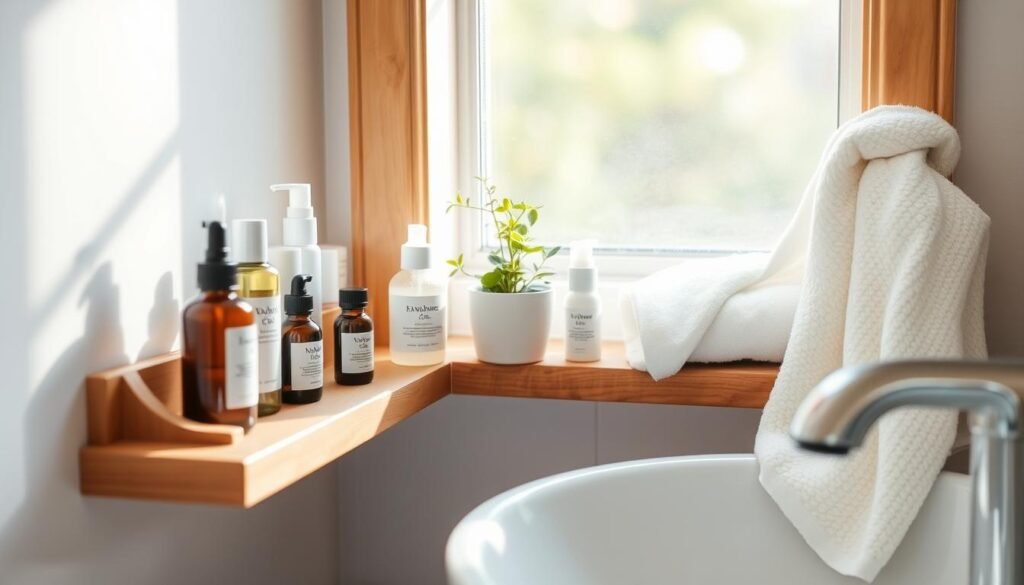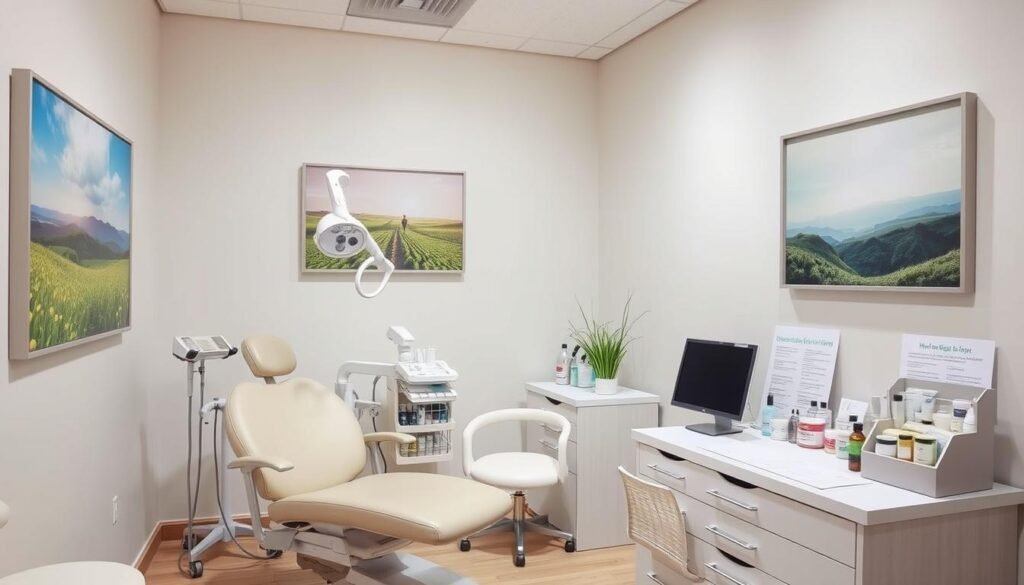About 1 in 5 people have acne scars on their face, chest, or back. This fact shows how widespread the issue of hyperpigmentation, especially from pimples, is. For many, these dark marks impact their confidence, leading them to seek effective remedies.
Knowing how to erase dark spots from pimples is key for those facing these concerns. Dark spots, or post-inflammatory hyperpigmentation (PIH), are especially common in those with darker skin tones. They can last for months or years. This article will explore detailed methods for acne scar treatment. We will look at medical and natural ways to fade dark marks and encourage good skin care habits.
Key Takeaways
- 1 in 5 people experience acne scars on visible areas of their body.
- Dark spots are particularly common among individuals with darker skin tones.
- Early treatment of acne is vital to prevent permanent scarring.
- Medical treatments include laser therapy, topical retinoids, and hydroquinone.
- In-home care can effectively manage and reduce the appearance of dark spots.
- Preventive practices, such as avoiding picking at pimples, are crucial.
- Acne scars can significantly impact individuals’ mental well-being.
Understanding Dark Spots and Scars
Dark spots and acne scars are common skin issues after inflammation or breakouts. Dark spots, often called post-inflammatory hyperpigmentation (PIH), are flat areas caused by inflammation like a pimple. With time, these spots can fade and might fully go away with patience. Various treatments, such as chemical peels or topical agents, can help but their effectiveness varies.
Acne scars, on the other hand, are deep skin damage that affects texture as well as color. They can look indented or raised and need more intense treatments than dark spots. Knowing the difference between these issues is crucial for the right treatment. Early treatment can help avoid more problems and lead to a smoother skin.
What Causes Dark Spots from Acne?
Dark spots often appear after acne due to the skin reacting. When a pimple pops up, your body makes more melanin. This is called Post-Inflammatory Hyperpigmentation, more common in darker skin tones.
Picking at pimples can make dark spots worse. This breaks the skin’s barrier and leads to more melanin. Dermatologists say treating acne early can prevent these dark spots, especially in darker-skinned people. People with skin of color are more likely to get these marks.
Treating acne well can lower the chances of dark spots or keloids. Ingredients like retinoids, benzoyl peroxide, and salicylic acid work well on these skin types.
Dermatologists recommend treating acne and dark spots together. A comprehensive skincare plan can fix and reduce dark patches. It’s good to avoid pore-clogging products and use non-comedogenic makeup for acne prevention.
Dark spots can also affect emotions deeply. Studies show they can lead to distress. Dermatologists can help with a plan that includes gentle cleansing and lifestyle changes. This helps manage acne and improve skin’s look.
| Skin Type | Risk for PIH | Recommended Ingredients |
|---|---|---|
| Light Skin | Moderate | Salicylic Acid, Retinoids |
| Medium Skin | High | Benzoyl Peroxide, Glycolic Acid |
| Dark Skin | Very High | Azelaic Acid, Hydroquinone |
How to Remove Dark Spots Caused By Pimples
Dark spots can linger after pimples heal, signaling post-inflammatory hyperpigmentation (PIH). Understanding PIH is key to treating it right. These spots, dark pink or brown, result from the skin reacting to acne. They can stick around for a long time, sometimes up to two years. Treating acne and dark spots at the same time is crucial for skin healing. Keeping a regular skincare routine is very important.
Recognizing Post-Inflammatory Hyperpigmentation
When acne damages the skin, it can lead to too much melanin production. This causes the dark spots seen after pimples heal. You might see these spots change color over time, possibly transitioning from dark pink to brown. Gentle cleansing and staying hydrated can help the skin heal. To learn more about handling skin problems, check out how smoking affects acne with this resource.
Difference Between Scars and Dark Spots
Dark spots and acne scars are different. Scars show deeper damage, feeling different than the rest of the skin. They can look indented or raised. Treatments like microneedling and chemical peels work for both issues. Knowing whether you have scars or dark spots helps find the right treatment. This improves your skin’s look and feel.
Effective Medical Treatments for Dark Spots
Effective treatment for dark spots combines prescription meds and special procedures. These methods focus on reducing post-inflammatory hyperpigmentation and scars. They help make the skin look natural and smooth again.
Prescription Medications: Retinoids and Hydroquinone
Retinoids and hydroquinone are key in fading dark spots. Retinoids speed up the replacing of dark cells with new ones. Hydroquinone helps by reducing melanin, making spots lighter.
- Retinoids: Improve skin texture, fade dark spots, and reduce acne scars.
- Hydroquinone: Targets hyperpigmentation, with visible results in 4 to 6 weeks.
Advanced Procedures: Laser Therapy and Chemical Peels
Laser therapy and chemical peels offer quick results for treating dark spots. Lasers focus on spots without harming nearby skin. Chemical peels remove the top skin layer, revealing a brighter skin tone.
| Procedure | Effectiveness | Recovery Time | Cost |
|---|---|---|---|
| Laser Therapy | High; results visible within weeks | 1-2 weeks for redness to fade | Varies by provider, usually $500-$2,500 |
| Chemical Peels | Moderate; may require multiple sessions | 3-7 days for peeling | Typically $150-$600 per session |
Seeing a dermatologist is key to get a plan that fits you. They determine the best treatments for your skin type to reach your goals.
Natural Remedies for Fading Dark Spots
Using Natural Remedies for Dark Spots is a kind and effective way to address skin color changes from acne. Natural solutions can be good alternatives or additions to medical treatments, especially for those with sensitive skin. Ingredients like Vitamin C, aloe vera, and grapeseed extract are popular for their ability to lighten dark spots over time.
Benefits of Vitamin C and Aloe Vera
Vitamin C is known for making skin brighter. It stops melanin from being made, which helps in reducing dark marks. Using Vitamin C regularly can lessen pigmentation and create an even skin tone.
Aloe vera is also very effective. It has aloin, a compound that lightens the skin. Besides lightening dark spots, aloe vera helps in healing the skin. This makes it great for people with acne.
Using Grapeseed Extract for Skin Discoloration
Grapeseed extract is an impressive solution. It has calming effects that may reduce hyperpigmentation. Its antioxidants help skin recover and become brighter. For many people, these natural remedies effectively lead to clearer, more glowing skin.
For more tips on dealing with skin problems like acne, check this out: types of acne. Knowing about acne can help in finding the right treatment and keeping skin healthy.
Over-the-Counter Products to Consider
Finding the right over-the-counter products is key for better skin tone, especially after acne. It’s about knowing which Skin Discoloration Remedies work best. This means understanding the active ingredients that fit your skin needs.
Identifying Key Ingredients for Effectiveness
There are special ingredients in effective over-the-counter products. They focus on dark spots and improving skin tone. Here are the major ones:
- Retinoids: Improve skin texture and tackle hyperpigmentation.
- Niacinamide: Boosts water retention and collagen, reducing fine lines.
- Azelaic Acid: It’s anti-inflammatory, helping with acne and its dark marks.
- Hydroquinone: Fades dark spots but may not suit sensitive skin.
- Kojic Acid: A natural option for age spots and acne scars.
- Mandelic Acid: Good for wrinkles and uneven skin tone.
Using these ingredients can show results in about three months. This assumes you use them consistently every day.
Potential Risks of OTC Treatments
While convenient, over-the-counter products come with risks. Know these side effects:
- Skin Irritation: Some ingredients, like hydroquinone and retinoids, may cause redness or peeling.
- Allergic Reactions: Always do a patch test to avoid bad reactions.
- Hypopigmentation: Products like azelaic acid might lighten the skin too much, especially in darker skin tones, if used incorrectly.
Being informed about these risks helps you make better choices for your skin.

Importance of Sun Protection
It’s key for everyone to know why sun protection matters. Using sunscreen with SPF 30 or more every day helps keep skin healthy. It cuts down on dark spots and makes skin tone even. Sunscreen guards us from UVA and UVB rays. This protection stops dark spots, also called age spots, from forming because of too much sun and skin damage.
Sunlight can harm our skin cells’ DNA. This might lead to serious issues like skin cancer. The Skin Cancer Foundation says that 1 in 5 Americans will get skin cancer by 70. It’s crucial to protect our skin, especially from 10 am to 4 pm when the sun is strongest.
Wearing hats and sunglasses protects our face and eyes even more. Surfaces that reflect light, like sand and sidewalks, can bump up our sun exposure. This happens even on cloudy days. That’s why we should always wear sunscreen. It not only prevents dark spots but also keeps our skin looking younger by avoiding wrinkles and fine lines.
- Apply sunscreen daily, even when indoors.
- Reapply sunscreen every two hours, especially if spending time outdoors.
- Choose a non-comedogenic formula to avoid clogging pores.
- Incorporate sunscreen into your skincare routine for maximum effectiveness.
- Look for ingredients like zinc oxide or niacinamide to benefit acne-prone skin.
Regular sun protection helps us keep our skin healthy. It also prevents dark spots and early aging signs. Drinking plenty of water, eating well, and following a skincare routine recommended by dermatologists boost our sun protection. This keeps our skin in top shape.
Home Care Routine for Reducing Blemishes
An effective home care routine is key to reducing blemishes and dark spots. Such a regimen should include gentle cleaning, keeping the skin moist, and protecting it. This approach helps keep the skin healthy and targets problems like hyperpigmentation and scars from acne.
Gentle Cleansing and Moisturizing Tips
A mild cleanser is important for cleansing. Choose ones with salicylic acid or tea tree oil for acne-prone skin. Clean your face in the morning and night to get rid of dirt and oil. But, make sure it doesn’t irritate your skin. After cleaning, use a light moisturizer to keep your skin hydrated. Pick moisturizers with aloe vera or glycerin for soothing the skin.
How to Avoid Picking or Popping Pimples
Not picking or popping pimples is crucial in a skin care routine for clear skin. Picking can cause more problems like scars, swelling, and infection. Use treatments with benzoyl peroxide or sulfur on spots instead. Short nails can also prevent touching your face too much.

| Step | Recommended Action | Key Ingredients |
|---|---|---|
| 1. Cleansing | Cleansing twice daily | Salicylic acid, Tea tree oil |
| 2. Moisturizing | Apply lightweight moisturizer | Aloe Vera, Glycerin |
| 3. Spot Treatment | Avoid picking, use spot treatments | Benzoyl peroxide, Sulfur |
Keeping an organized routine not only feeds the skin but also helps in getting a clearer skin over time. Staying consistent with a home care routine is a must for lessening blemishes and improving the health of your skin.
How to Maintain Results Over Time
Keeping clear skin takes long-term care and consistent skincare routines. Once acne is treated and dark spots reduced, it’s key to keep up a routine. This helps maintain skin health and stops new breakouts. Use products with benzoyl peroxide, salicylic acid, or adapalene to keep skin clear. These active ingredients help prevent pores from clogging while treating any left-over dark spots.
Seeing a dermatologist regularly is crucial for lasting care. They offer advice suited to your skin type and needs. Sometimes, they might suggest chemical peels or microneedling to deal with scars or dark spots. A good at-home care routine, along with professional advice, yields the best outcomes.
Sun protection is essential for clear skin. Wearing sunscreen every day protects against UV rays and lowers the chance of dark spots. It’s important to use a sunscreen with at least SPF 30 for the best protection.
Good lifestyle choices also help keep skin clear. Drinking plenty of water, eating a diet rich in antioxidants, and managing stress can improve skin’s look. Regular workouts boost blood flow, making skin look even better. Combining these habits helps keep skin clear long after initial treatments.
For tips on at-home treatments and more strategies, visit here. This site provides lots of advice for continuous skincare.
When to Consult a Dermatologist
If you have dark spots or scars from pimples that won’t go away, it’s time to seek help. Seeing a Dermatologist is crucial when home remedies and over-the-counter products don’t work. If your condition gets worse or doesn’t change, a professional might have the right solution.
Feeling upset about scars or dark spots is another good reason to get help. If acne is harming your mental health, a dermatologist’s help can boost your confidence. They can tailor treatments to improve your skin and how you feel about yourself.
Dermatologists have many treatments to offer, like prescription meds and other specific therapies. They create personalized care plans. This means you get treatments that are just right for your skin type and problems, which leads to better outcomes.
Adults, especially women, sometimes get acne later in life. This can make skin problems more complex. In such cases, seeing a dermatologist quickly can avoid worse issues and scars. Their expert care can conquer even the toughest skin problems.

It’s also good to know that insurance might cover dermatologist visits when it’s necessary. Ask about your insurance and payment options. With the right help, achieving clear skin is possible for anyone struggling with acne.
Conclusion
Many people want to get rid of dark spots and scars from acne. This condition, known as post-inflammatory hyperpigmentation (PIH), can harm self-esteem. Fortunately, there are ways to manage this issue. Using key ingredients like hydroquinone and retinoids is vital. Plus, applying sunscreen consistently is crucial for anyone wanting clearer skin.
This article has shared different ways to deal with PIH and better skin quality. There are many options available, from simple products to professional treatments like peels and laser therapy. It’s also very important to keep up a good skincare routine. This includes washing gently and moisturizing to prevent new blemishes.
Getting rid of dark spots takes time and patience. But, with the right steps, big improvements are possible. Talking to a dermatologist can offer personalized advice. Following these treatment and protection steps can lead to a clearer and brighter skin.